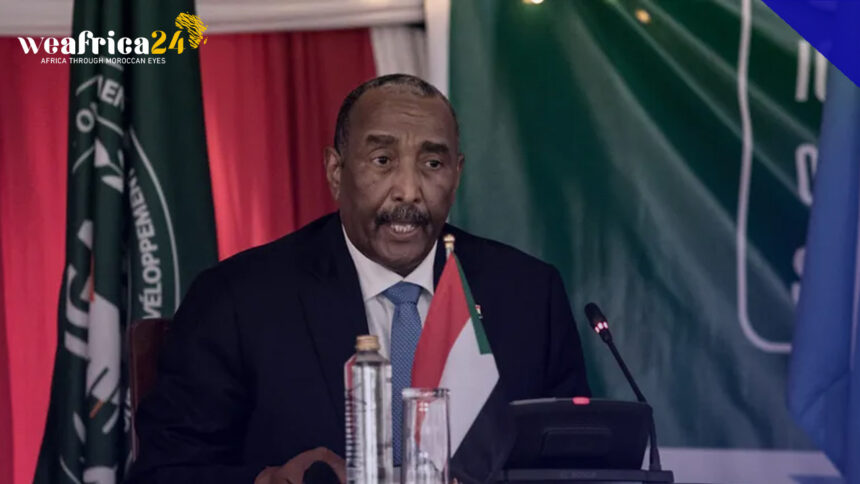Sudan formally announced on Saturday the complete suspension of its membership in the Intergovernmental Authority on Development (IGAD) after a previous decision to freeze engagement with the regional organization comprising six East African countries.
The Sudanese Ministry of Foreign Affairs affirmed that the Sudanese government is not bound by nor concerned with everything issued by IGAD regarding Sudanese affairs.
This comes one day after the summit held by IGAD in the Ugandan capital, Kampala, which concluded with a directive for military leaders, Abdelfattah al-Burhan and Rapid Support Forces commander Mohamed Hamdan Dagalo “Hemetti,” to hold direct talks within two weeks to discuss ending the ongoing conflict between the two factions since mid-April. The summit also decided to establish a specific timeline for the African roadmap, including the deployment of regional forces in the Sudanese capital, Khartoum.
According to a statement from the Sudanese Ministry of Foreign Affairs, Burhan sent a letter on Saturday to the current IGAD president, Djibouti’s President Ismaïl Omar Guelleh, informing him of Sudan’s government’s decision to freeze its membership in the organization. This was in response to IGAD’s alleged disregard of Sudan’s official communication last week, notifying the organization of the suspension of its engagement and freezing of dealings on any matters related to the current situation in Sudan. Additionally, IGAD included an agenda item on Sudan in the extraordinary summit of heads of state and government, which took place in Kampala on Thursday.
Strict Confirmations
IGAD affirmed its determination to use all means and capabilities to halt the war in al Khartoum, find solutions to the country’s crisis, and launch a political process in collaboration with the African Union, starting with a comprehensive meeting within a month. The organization also aims to garner international support after the cessation of hostilities.
Heads of state from Djibouti, Kenya, Uganda, South Sudan, and Somalia, along with the chairperson of the African Union Commission and the UN Secretary-General’s Special Envoy for Sudan, attended the summit. Additionally, representatives from several countries participated.
The country’s leader, al-Burhan, was absent from the summit after Sudan announced the freeze of its engagement in the efforts to end the war. However, Hemetti and a delegation from the Sudanese Coordination of Civil Forces “Taqadom” attended, led by former Sudanese Prime Minister Abdullah Hamdouk.
Hemetti and Hamdouk expressed their support for IGAD’s efforts and emphasized the importance of working with IGAD, the African Union, and the international and regional communities to achieve peace in the country.
A New Reality in Sudan
In recent hours, numerous speculations have arisen about Al Khartoum’s imminent return to Chapter VII, amidst questions about the possible outcomes of the current crisis that has led to the deaths of more than 12,000 people, the displacement of around 8 million, and extensive destruction in the capital and several cities.
Experts and observers expect that the current situation will lead to explicit international intervention to prevent the prolongation of the war, exacerbating human and material losses, and the humanitarian suffering faced by over 40 million Sudanese.
In the past few hours, several indicators have emerged, suggesting a move towards internationalization, as regional and international anger has significantly escalated.
The African Union announced the formation of a high-level tripartite committee, led by Mohamed Shembas, the AU’s High Representative, to silence the guns. The committee includes Symbiose Wandera, former Ugandan Vice President, and Francisco Madeira, the former AU Special Representative to Somalia. Their task is to work with all parties to restore peace and stability.
In another sign supporting the hypothesis of international intervention, there seems to be a growing conviction within the international community and the United Nations that it is necessary to resolve the crisis as quickly as possible to halt the alarming deterioration of security and humanitarian conditions in a country where over 20 million people lack the necessities of life, according to the latest UN report.
This sentiment was expressed by Ramtan Lamamra, the Special Envoy of the UN Secretary-General for al Khartoum, and Radwan Noyeser, the UN expert on human rights in Sudan. Lamamra emphasized the seriousness of the situation in the country, while Noyeser stated that there seems to be no solution on the horizon, despite multiple regional and international initiatives. He pointed out significant violations of international humanitarian and human rights law committed by the warring parties.







